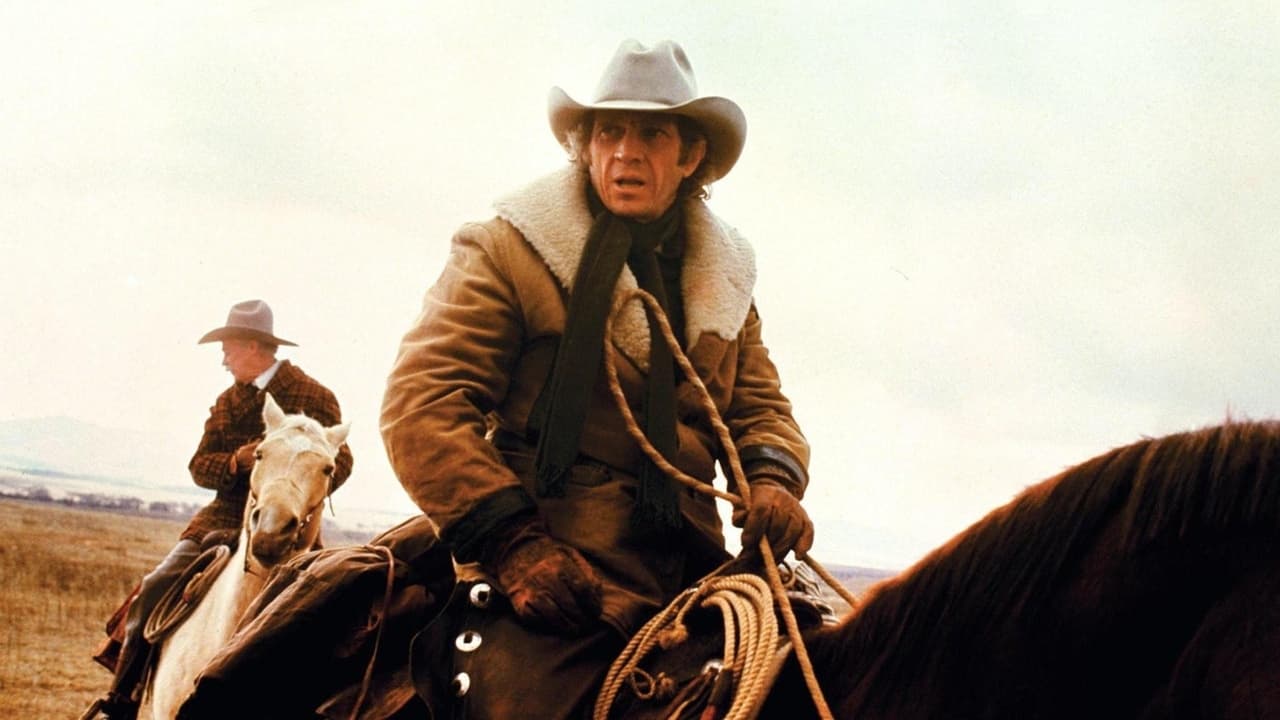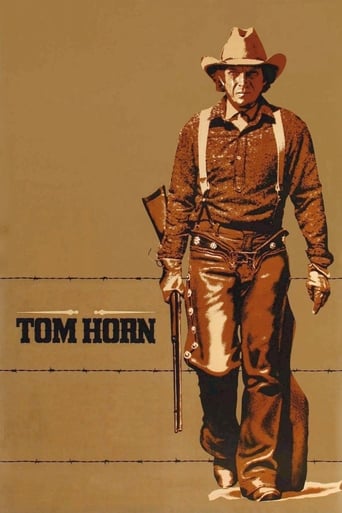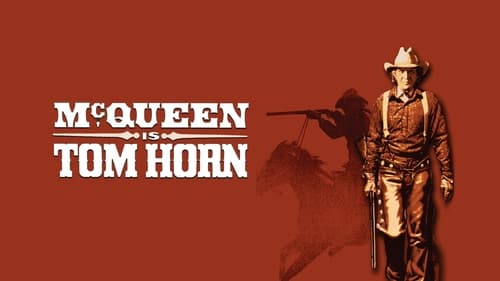



I saw this movie before reading any reviews, and I thought it was very funny. I was very surprised to see the overwhelmingly negative reviews this film received from critics.
View Moreif their story seems completely bonkers, almost like a feverish work of fiction, you ain't heard nothing yet.
View MoreThe movie is wonderful and true, an act of love in all its contradictions and complexity
View MoreThis is one of the best movies I’ve seen in a very long time. You have to go and see this on the big screen.
View MoreThis is unfairly forgotten western from the decade were western were slowly dying until the 1985. " Tom Horn" deserves more praise , since this is a good western and one of last movies of Steve McQueen. It's his last good movie.The movie is full of brilliant dialogues. I don't remember when was the last time I have seen a movie where almost every exchange is intelligent and funny. The movie is worth watching for the dialogues alone.The story is a little predictable , but the movie is well directed by William Wiard and grips you from start to finish. I felt sad at the end and that was the whole point.The movie made me sad , because it was not only the goodbye to Tom Horn, but also to Steve McQueen ("Papillon") . Both were heroes from the past that were slowly dying in a changing world that didn't need them. McQueen did make one more movie after this one , but for me this is his good bye. A good movie and a great farewell to wonderful actor.I give it 7/10.
View MoreSteve McQueen delivers a memorable performance filled with character and nuance as the real-life Indian tracker, cavalry scout, and range detective in television director William Wiard's biographical western "Tom Horn," co-starring Linda Evans, Richard Farnsworth, Billy Green Bush, Elisha Cook, Geoffrey Lewis, and Slim Pickens. Superb production values, a solid cast, and splendid scenery stand out in McQueen's second-to-last film when he felt the first effects of the inoperable lung cancer that killed him in 1980. Unfortunately, despite these strengths and the quotable dialogue in the Thomas ("Missouri Breaks") McQuane and Bud ("J.W. Coop") Shrake screenplay, "Tom Horn" qualifies as a dreary, pretentious western that falls apart during its last half hour. The problem is simple. This is one of those tedious end-of-the-frontier yarns where hero bites the dust, and McQueen's protagonist tumbles to the status of a pathetic wretch before he hangs. Neither "Tom Horn" nor "The Hunter," his last two starring efforts, captured McQueen at his height in "The Magnificent Seven," "The Great Escape," "The Getaway," and "Bullitt." Clearly, McQueen must have been reevaluating his career because he doesn't play it cool in either "Tom Horn" or "The Hunter." He draws attention to his short statue; he stood five feet nine and a half inches and refers to himself as a little fellow. Similarly, in "The Hunter," he plays a character who encounters trouble after he climbs behind the wheel of a car! This revisionist philosophy on McQueen's part can even be traced back to his decision to star in the Henrik Ibsen play "An Enemy of the People" where he sports a beard, clutches an umbrella,and plays an environmentalist."Tom Horn" opens with this foreword: "He grew up in the violence of the old West. He became a cowboy, rode shotgun for the stage lines, was an agent for the Pinkertons, and fought with the Rough Riders under Teddy Roosevelt. He made his reputation as a cavalry scout by capturing Geronimo in the bloody Apache wars. In 1901, he drifted into Wyoming Territory." Indeed, aside from their catchy dialogue, McQuane and Shrake's pretentious screenplay confines itself to the twilight years of Horn's career in the great Northwest. McQuane and Shrake based their script on the "Life of Tom Horn, Government Scout and Interpreter, Written by Himself." Sadly, this represents one of those times when sticking to the facts wasn't the best idea.Anyway, "Tom Horn" gets off to a promising start. Our hero rides into a frontier town for a drink in the saloon and tangles with future heavyweight boxing champ 'Gentleman' Jim Corbett. Horn criticizes the dapper pugilist (Steve Oliver of "Angels from Hell") for being a lesser celebrity than Geronimo. Wiard cheats us because he doesn't show the fisticuffs the ensued between Horn and Corbett. Later, cattleman John C. Coble(Oscar winning actor Richard Farnsworth) finds Horn nursing his injuries in a stable and persuades him to recuperate at his ranch. Coble explains the cattlemen's predicament in a deftly photographed scene lensed through the slats of a fence. "Any means that you have to take to eliminate this rustling problem, we're all behind you 100 per cent." Later, at a big Cattlemen's Association picnic at Coble' spread, as the guests dine on lobster, another cattleman summarizes their situation to Horn. "We've got a hell of a range problem here. The damned rustlers have completely wiped out our herd profits. Not to mention what the blizzard and predators have done to our calf problem, people are homesteading our range land and raising sheep on our grass." The bottom line is the Cattlemen's Association wants Horn eradicate the rustlers, but they want no apparent connection between Horn and them. Indeed, Horn takes care of the rustling crisis. He isn't afraid to gun down the rustlers, and he gives no quarter in a gunfight. The scene where Horn interrupts an auction and identifies himself as a 'stock detective' is dramatically satisfying, especially when he backs his horse off the premises, something you rarely see in westerns. The night-time shoot out with the rustlers in the barn is interesting and Horn shows his anger later when he kills Lee Mendenhour (Roy Jenson of "The Ambushers") after Mendenhour shoots his horse. Tom pumps three extra slugs into the dead man. The violence, however, takes a terrible toll on public sentiment,and the cattlemen want to distance themselves from Horn. Somebody then kills an innocent homesteader's son, teenager Jimmy Nolt (Clark Coleman of "Kuffs") and frames Horn for the murder. Later, sneaky U.S. Marshal Joe Belle(Billy Green Bush of "Five Easy Pieces") arranges an interview with Horn while a journalist in an adjacent next room transcribes their conversation."Tom Horn" loses any sense of momentum about 65 minutes into the action when our hero winds up behind bars. Wiard fractures the narrative structure with flashbacks of Horn and schoolmarm Glendolene Kimmel (Linda Evans of "Avalanche Express") and events occur definitely out of place. McQueen and Evans generate no sparks as a romantic couple, and their romance frizzles. Their best scene occurs when they are standing between their horses and Tom's horse nudges him closer to her. Prosecutor Walter Stoll (Geoffrey Lewis of "High Plains Drifter") uses Tom's altered testimony taken down without his knowledge to convict him. In real-life, Horn was railroaded; the likely culprit was the jealous marshal Belle."Tom Horn" suffers from severe editing problems and things bogs down after Horn ends up in jail. Nevertheless, "Tom Horn" boasts some funny low-key humor, especially during the lobster scene when Horn proclaims, "Be darned, I never eaten a bug that big before," and a couple of tautly handled gunfights. Meanwhile, McQueen looks cool in his broad-brimmed Stetson, and he handles his rifle as if he's put some rounds through it. Wiard stages several interesting zoom outs when Horn fires at his targets. Altogether, "Tom Horn" boasts a lot of authentic atmosphere and the dramatic irony is effective, but the film is too disillusioning to be entertaining.
View MoreThis is an odd movie. It's a western, but also is like a film noir where few people, if any, do the right things and the usual Hollywood happy ending is non-existent. It almost leaves you depressed. In fact, it does. Yet, I was glad to have finally seen this movie, however, even if it was so long overdue, and think that many of the poor reviews (not here) are unjustified.This movie is SO Steve McQueen: a tough guy with few words, a likeble man ("Tom Horn,"the title character) who gets the job done no matter how tough the assignment; a guy the prettiest woman in town goes for and a man who gets respect of the other (good) men in town. However, unlike many of his roles, the last 20-30 minutes reveals a totally unique character, and one that is puzzling.Viewers of this would not be blamed for yelling at the screen, imploring "Tom" to "say something in your defense! Speak up!! Tell everyone you are innocent!"McQueen's "Horn" either is resigned to leaving the world perhaps the way he thought he should, with a shrug of his shoulders as if saying "that's the way it goes" or he's imitating Jesus Christ, who did similar when he spent his last day in kangaroo courts. He, too, wouldn't answer questions and state the obvious. To paraphrase McQueen in this story, it's like, "Hey, if you don't know who I am and what I'm all about I am by now, well....do what you gotta do."Anyway, much of the film is a good western, nicely photographed and uniquely low-key with McQueen hired by a bunch of ranchers (an "Association") to put a stop to all the rustling that has been going on in the area recently. He does just that. In fact, he apparently does his job TOO well.Depsite this being a quiet movie, the action scenes are quick and very violent. Yet, McQueen and many of his friends in here are so low-key it makes for a strange western....and oddly fascinating, I thought. A pity this isn't better known, especially since it was McQueen's second-to-last film before dying of cancer. He looks different, too. He doesn't look well and it must have taken some courage to make this film feeling as he did. Despite the haggard looks, underneath, it's the same old Steve.
View MoreAs one of my personal favorite westerns I have looked at this film several times and wondered how McQueen was able to give such a fine performance as the title role of Tom Horn. McQueen signed on to do the role in 1977, and would spent three years researching the role and even spending the night at Tom Horn's grave to help develop the his character. The film is viewed by many to be very dark and not historically right, but viewing this film more than once you see that the character is really the victim and not the enemy. You also see this a different side of McQueen and the way he portrayed this character. For me anyways the picture will always remain in my top ten films of all time, just for its acting talent and superb camera-work. When viewing the film notice how McQueen portrayed the character as never being afraid of anybody even death. This is also an example of a standard western in which the hero dies honorably without showing fear. The courtroom scenes are also very interesting to watch on how the character seems to loose himself in the end.
View More